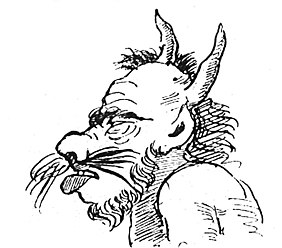Bies

Bies /ˈbjɛs/ or bes (Russian: бес [ˈbʲɛs]) is an evil spirit or demon in Slavic mythology. The word is synonymous with chort.
After the acceptance of Christianity the bies became identified with the devil, corresponding to the being referred to in Ancient Greek, as either daimon (δαίμων), daimónion or pneuma (πνεῦμα). For example, biesy (Russian plural of bies) is used in the standard Russian translation of Mark 5:12, where we have the devils entering the swine in KJV.[1][2][non-primary source needed] Compare to Ukrainian bisy or bisytysia (to go mad). In Slovenian (bes), Croatian (bijes) and Serbian (bes) the word means "rage", "fury".[3][4]
Examples in culture[]
- In Alexander Pushkin's The Tale of the Priest and of His Workman Balda, there is a scene in which Balda has to force the "devils" (черти, Chorti) of the sea to pay an ancient rent, and interacts with an "Old Bies" who is their leader and his grandson. It is also the title of his poem "Demons" (Бесы).
- The original Russian title of Fyodor Dostoevsky's novel known in its English translation as The Possessed is Besy (Бесы) (Russian plural of bes), i.e., more literally, The Evil Spirits.
- Fyodor Sologub’s most famous novel was Мелкий бес (The Petty Demon, 1907)
- The Black Tapes
- In the 2015 videogame The Witcher 3: Wild Hunt, fiends (called bies in the original version) are massive horned predators who possess hypnotic and self-healing powers.
- In Ivana Brlić-Mažuranić's Croatian Tales of Long Ago "bjesovi" appear.[5]
References[]
- ^ Mark 5, Russian text
- ^ Mark 5, KJV English text
- ^ "Hrvatski jezični portal". hjp.znanje.hr. Retrieved 2019-02-01.
- ^ "Reconstruction:Proto-Slavic/běsъ - Wiktionary". en.wiktionary.org. Retrieved 2019-02-01.
- ^ Brlić-Mažuranić, Ivana (2007). Priče iz davnine - III. dio. Zagreb: Večernji list d. d. pp. 5–38. ISBN 978-953-280-005-0.
≃
Categories:
- Slavic demons
- Devils
- European mythology stubs